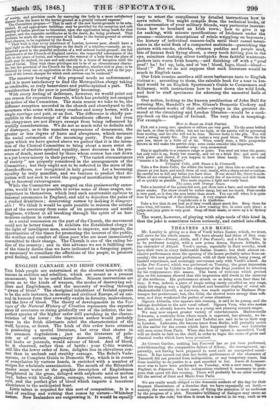ENGLISH CARNAGE AND IRISH COOKERY.
TEE Irish people are entertained at the shortest intervals with lessons in sedition and rebellion, which are meant as a present amusement, but to be useful hereafter. Minute instructions are given as to the kinds of weapon, the modes of destroying sol- diers and Englishmen, and the necessity of wading through "rivers of blood." The aboriginal inhabitant of Ireland appears to be the sole instance, in modern and civilized Europe, of an ani- mal in human form that avowedly exults in ferocity, malevolence, and 'the love of blood. The theory of developments in the Ves- tiges of the Natural History of Creation represents the superior races of creatures as rising gradually out of the inferior, the im- perfect species of the higher order still partaking in the charac- teristics of the lower : the ingenious author would probably trace in the Irish dilettante rebel the characteristics of the wolf, hytena, or ferret. The Irish of this order have attained to possessing a special literature, but even that shares in the common degradation ; just as the literature of pole- cats or of certain sanguinary domestic insects, if they had books or journals, would savour of blood. And of blood, be it observed, rather than of battle : your Celtic warrior, still like the lower order of ferte, delights less in chivalrous con- test than in ambush and stealthy carnage. The Rebel's Vade- mecum, or Complete Guide to Domestic War, which is in course of compilation by various hands, is enriched with a number of recipes for wholesale assassination. The mouth of the Ribandish reader must water at the graphic description of Englishmen slaughtered in the gross, deluged with sulphuric acid or molten lead, babes with bloody shirts, carnage, torture, corpses hot or cold, and the perfect Out of blood which imparts a luxurious abundance to the anticipated feast.
Little talent is required for this sort of composition. It is a kind of reading and writing that comes by nature—Whiteboy nature. New Zealanders are outgrowing it. It would be equally
easy to retort the compliment by detailed instructions how to serve rebels. You might compile from the technical books, or the conversation of your military friends, very particular instruc- tions how to bombard an Irish town ; how to give it up for sacking, with minute specifications of Irishmen under the process—elaborate descriptions of rebels wriggling on bayonets ; the history of individual cannon-balls until their career termi- nates in the solid flesh of a compacted multitude—garnishing the picture with smoke, shrieks, crimson puddles and purple mud, bits of human flesh flying about, a stray tooth hitting you in the eye, scimitars dashing silver toothpicks from faithful waistcoat- pockets into warm Irish hearts,—and finishing off with a " pouf pouf ! ha! ha! up, lads, and at 'em blood, Iago, blood—blood- blood !" But we do not suppose that such literature would be much to English taste.
Our Irish cousins ascribe a still more barbarous taste to English visitants : according to them, the saleable book for a tour in Ire- land would be an English Sportsman's Guide to Connemara and Killarney, with instructions how to hunt down the wild Irish, and how to stuff specimens for adorning the ancestral halls at home.
Our notion, looking to the known predilection of John Bull for perusing Mrs. Rundell's or Mrs. Glasse's Domestic Cookery and other standard works of that order—always in the greatest de- mand at the circulating and London libraries—would be a cook- ery-book on the subject of Ireland. The very idea is tempting. For example--
Row to Roast an Irish Patriot.
Pick out a young one; speakers or editors are very good. Tie the arms behind the back, or close to the sides; but not too tight, or the patriot will be prevented from moving, and the ribs will not be done. Skewer down to the pile. You will want a strong steady fire. Dry pine makes a very good blaze. When the fire gets low, throw in a little oil or fat. When nearly done, a little gunpowder thrown in will make the patriot skip: some cooks consider this important.
Another way: very economical.
This is applicable to a common range or grate. You need not truss the game; but only take it up, firmly but smartly, and set on a brisk fire; and serve out with poker and shovel, if you happen to have them handy. This is called " tenants it is Molly Maguire."
Crimped Celts, with Sauce a is Cromwell.
Take a few dozen Celts, the wilder the better ; put them into as small an en- closure as you have, and notch them all over, neatly, with a sharp sword or cutlass. Be careful not to kill any before you have done. If one should die, throw it aside. When all are crimped, place them before a steady fire of musketry, and dish them all as quickly as possible. This mode requires a light and ready hand.
The same, with Orange Sauce.
Take a hundred of the potato-fed sort, pat them into a barn, and smother with straw smoke. The straw should be rather damp, but not too much. Peat-smoke is very good, as it does the eyes better than straw. You can tell when it is quite done by the leaving off of the shrieking. A very elegant dish. Confederates a la Guillotine. Take a few that do not look as if they would stand much fire. Keep them for some time, till tender. Place before a slow roasting fire, in some open place: a judge-and-jury grate is very good. Soap off their heads, or serve up a la Sydney Cove.
The worst, however, of playing with edge-tools of this kind is, that the joke is sometimes taken seriously, and carried into effect.


























 Previous page
Previous page